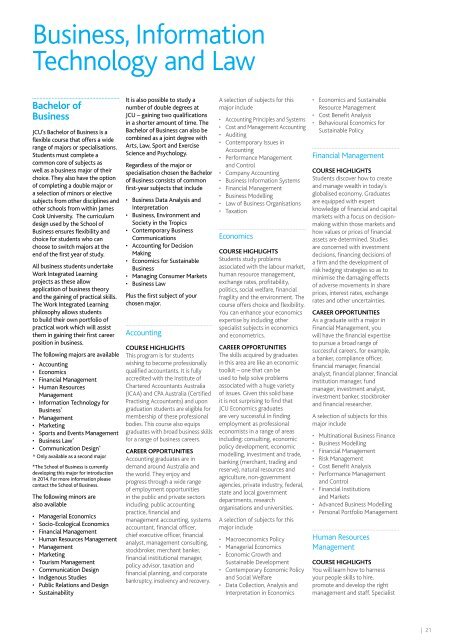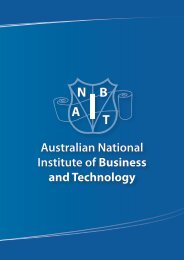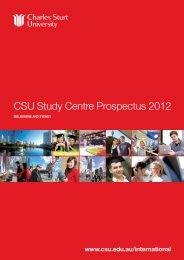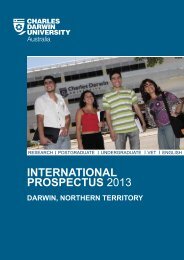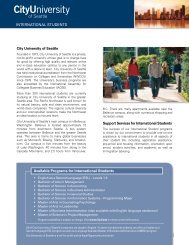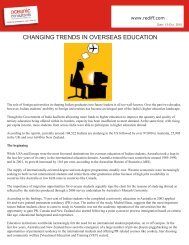International Undergraduate Prospectus - James Cook University
International Undergraduate Prospectus - James Cook University
International Undergraduate Prospectus - James Cook University
You also want an ePaper? Increase the reach of your titles
YUMPU automatically turns print PDFs into web optimized ePapers that Google loves.
Business, Information<br />
Technology and Law<br />
Bachelor of<br />
Business<br />
JCU’s Bachelor of Business is a<br />
flexible course that offers a wide<br />
range of majors or specialisations.<br />
Students must complete a<br />
common core of subjects as<br />
well as a business major of their<br />
choice. They also have the option<br />
of completing a double major or<br />
a selection of minors or elective<br />
subjects from other disciplines and<br />
other schools from within <strong>James</strong><br />
<strong>Cook</strong> <strong>University</strong>. The curriculum<br />
design used by the School of<br />
Business ensures flexibility and<br />
choice for students who can<br />
choose to switch majors at the<br />
end of the first year of study.<br />
All business students undertake<br />
Work Integrated Learning<br />
projects as these allow<br />
application of business theory<br />
and the gaining of practical skills.<br />
The Work Integrated Learning<br />
philosophy allows students<br />
to build their own portfolio of<br />
practical work which will assist<br />
them in gaining their first career<br />
position in business.<br />
The following majors are available<br />
• Accounting<br />
• Economics<br />
• Financial Management<br />
• Human Resources<br />
Management<br />
• Information Technology for<br />
Business *<br />
• Management<br />
• Marketing<br />
• Sports and Events Management<br />
• Business Law^<br />
• Communication Design^<br />
^ Only available as a second major<br />
*The School of Business is currently<br />
developing this major for introduction<br />
in 2014. For more information please<br />
contact the School of Business.<br />
The following minors are<br />
also available<br />
• Managerial Economics<br />
• Socio-Ecological Economics<br />
• Financial Management<br />
• Human Resources Management<br />
• Management<br />
• Marketing<br />
• Tourism Management<br />
• Communication Design<br />
• Indigenous Studies<br />
• Public Relations and Design<br />
• Sustainability<br />
It is also possible to study a<br />
number of double degrees at<br />
JCU – gaining two qualifications<br />
in a shorter amount of time. The<br />
Bachelor of Business can also be<br />
combined as a joint degree with<br />
Arts, Law, Sport and Exercise<br />
Science and Psychology.<br />
Regardless of the major or<br />
specialisation chosen the Bachelor<br />
of Business consists of common<br />
first-year subjects that include<br />
• Business Data Analysis and<br />
Interpretation<br />
• Business, Environment and<br />
Society in the Tropics<br />
• Contemporary Business<br />
Communications<br />
• Accounting for Decision<br />
Making<br />
• Economics for Sustainable<br />
Business<br />
• Managing Consumer Markets<br />
• Business Law<br />
Plus the first subject of your<br />
chosen major.<br />
Accounting<br />
Course highlights<br />
This program is for students<br />
wishing to become professionally<br />
qualified accountants. It is fully<br />
accredited with the Institute of<br />
Chartered Accountants Australia<br />
(ICAA) and CPA Australia (Certified<br />
Practising Accountants) and upon<br />
graduation students are eligible for<br />
membership of these professional<br />
bodies. This course also equips<br />
graduates with broad business skills<br />
for a range of business careers.<br />
Career opportunities<br />
Accounting graduates are in<br />
demand around Australia and<br />
the world. They enjoy and<br />
progress through a wide range<br />
of employment opportunities<br />
in the public and private sectors<br />
including: public accounting<br />
practice, financial and<br />
management accounting, systems<br />
accountant, financial officer,<br />
chief executive officer, financial<br />
analyst, management consulting,<br />
stockbroker, merchant banker,<br />
financial institutional manager,<br />
policy advisor, taxation and<br />
financial planning, and corporate<br />
bankruptcy, insolvency and recovery.<br />
A selection of subjects for this<br />
major include<br />
• Accounting Principles and Systems<br />
• Cost and Management Accounting<br />
• Auditing<br />
• Contemporary Issues in<br />
Accounting<br />
• Performance Management<br />
and Control<br />
• Company Accounting<br />
• Business Information Systems<br />
• Financial Management<br />
• Business Modelling<br />
• Law of Business Organisations<br />
• Taxation<br />
Economics<br />
Course highlights<br />
Students study problems<br />
associated with the labour market,<br />
human resource management,<br />
exchange rates, profitability,<br />
politics, social welfare, financial<br />
fragility and the environment. The<br />
course offers choice and flexibility.<br />
You can enhance your economics<br />
expertise by including other<br />
specialist subjects in economics<br />
and econometrics.<br />
Career opportunities<br />
The skills acquired by graduates<br />
in this area are like an economic<br />
toolkit – one that can be<br />
used to help solve problems<br />
associated with a huge variety<br />
of issues. Given this solid base<br />
it is not surprising to find that<br />
JCU Economics graduates<br />
are very successful in finding<br />
employment as professional<br />
economists in a range of areas<br />
including: consulting, economic<br />
policy development, economic<br />
modelling, investment and trade,<br />
banking (merchant, trading and<br />
reserve), natural resources and<br />
agriculture, non-government<br />
agencies, private industry, federal,<br />
state and local government<br />
departments, research<br />
organisations and universities.<br />
A selection of subjects for this<br />
major include<br />
• Macroeconomics Policy<br />
• Managerial Economics<br />
• Economic Growth and<br />
Sustainable Development<br />
• Contemporary Economic Policy<br />
and Social Welfare<br />
• Data Collection, Analysis and<br />
Interpretation in Economics<br />
• Economics and Sustainable<br />
Resource Management<br />
• Cost Benefit Analysis<br />
• Behavioural Economics for<br />
Sustainable Policy<br />
Financial Management<br />
Course highlights<br />
Students discover how to create<br />
and manage wealth in today’s<br />
globalised economy. Graduates<br />
are equipped with expert<br />
knowledge of financial and capital<br />
markets with a focus on decisionmaking<br />
within those markets and<br />
how values or prices of financial<br />
assets are determined. Studies<br />
are concerned with investment<br />
decisions, financing decisions of<br />
a firm and the development of<br />
risk hedging strategies so as to<br />
minimise the damaging effects<br />
of adverse movements in share<br />
prices, interest rates, exchange<br />
rates and other uncertainties.<br />
Career opportunities<br />
As a graduate with a major in<br />
Financial Management, you<br />
will have the financial expertise<br />
to pursue a broad range of<br />
successful careers, for example,<br />
a banker, compliance officer,<br />
financial manager, financial<br />
analyst, financial planner, financial<br />
institution manager, fund<br />
manager, investment analyst,<br />
investment banker, stockbroker<br />
and financial researcher.<br />
A selection of subjects for this<br />
major include<br />
• Multinational Business Finance<br />
• Business Modelling<br />
• Financial Management<br />
• Risk Management<br />
• Cost Benefit Analysis<br />
• Performance Management<br />
and Control<br />
• Financial Institutions<br />
and Markets<br />
• Advanced Business Modelling<br />
• Personal Portfolio Management<br />
Human Resources<br />
Management<br />
Course highlights<br />
You will learn how to harness<br />
your people skills to hire,<br />
promote and develop the right<br />
management and staff. Specialist<br />
| 21


